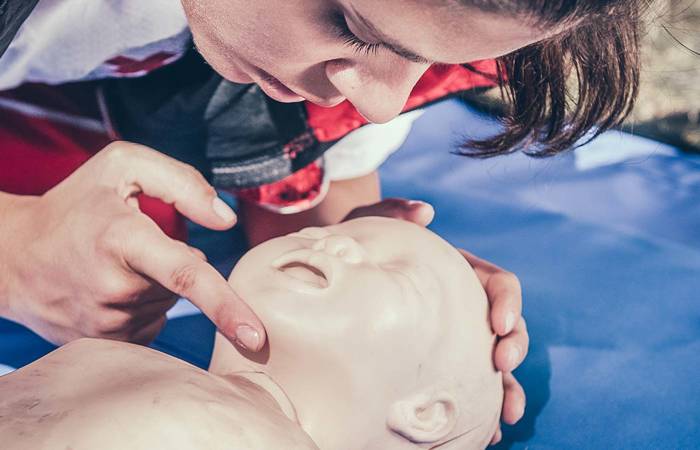Like what you see?
Sign up to receive more free parenting advice.
Thank you for subscribing to our newsletter!
Child Development

Credit: iStock.com/ \Halfpoint
Director of Paediatrics at the Gold Coast University Hospital Professor Susan Moloney answers some of the top questions parents pose about children aged five years and under.
Does my child need vitamin supplements?
All vitamins and minerals required for growth and development are present in breast milk and a nutritious diet. No added supplements are required for babies and infants. Some vitamins are fat soluble and accumulate in the body’s tissues and can be harmful at excess doses. If your baby was born prematurely they may have missed out on some iron stores in late pregnancy and will be prescribed iron supplementation until they are eating iron rich solids by your paediatrician/neonatologist.
As your baby gets older use your money to buy nutritious foods not added vitamins.
What is a tongue tie and when does it need treating?
We are all born with a frenulum or a web of tissue under the tongue. A tongue tie or ankyloglossia, is when this web stops the tongue from moving well. There are some babies who require this web to be released to use the tongue appropriately for feeding.
Cutting or lasering the tongue frenulum should only be done when required to enable full movement of the tongue for feeding, there is no evidence that doing this procedure in infancy will improve later speech, particularly if the tongue can poke out past the lips or can reach the roof of the mouth.
The mouth and tongue contain many nerve endings and is an enjoyable part of the body for babies and infants. It is important it remains pain free to prevent oral aversion and long term feeding problems. Tongue tie release should not be a routine part of newborn care.
When is vomiting a problem?
All babies will vomit as they are drinking large volumes of fluid for nutrition, have a small stomach volume and lie flat for most of the day. This causes regurgitation and you will see a lot of vomit over the first few years of a baby’s life. Vomiting in a happy growing baby does not require treatment or a change in feeds. Your baby will grow out of this as they start having a more solid diet and spend more time upright when they start to sit.
You should be worried about vomiting if it is sudden and very frequent. It may be a sign of infection or some rare conditions such as pyloric stenosis. If there is blood or green (bile) discolouration you should also seek medical help.
It is important that you do not give anti-nausea medications to babies, as they have severe side effects.
Gastro-oesophageal reflux is when regurgitation causes problems, for example vomiting so much there is not enough food intake to grow, or severe irritation and pain. In these circumstances you should see your GP for further advice.
A far less common cause is an allergy to proteins in milk. It is more common if some anti reflux medications are being used. There will be skin rash, diarrhoea and sometimes blood. It is not just some increased flatulence and loose stools. Lactose deficiency or intolerance is frequently blamed but is extremely rare. You should consult your GP or paediatrician if you are worried about allergy before changing from breast milk or changing formulas.
What is a fever and when do I get worried?
Fevers are an important part of the body’s defence response to infection, they can however be the sign of more serious problems. Fever itself will not cause harm but the underlying cause may do so.
Any baby under three months of age with a fever above 38°Celsius should be seen by a medical expert. At this age a baby’s immune system is immature. The passive immunity from pregnancy and breast-feeding is waning and immunisations have not had a full protective effect. This is the time of your life when you have the highest risk of severe bacterial infection. Most fevers are due to mild infections but that should be diagnosed by a medical expert.
If your baby is older and has a fever above 39° Celsius or has other symptoms suggestive of a serious infection such as vomiting, confusion, stiff neck, rash, sore throat or cough you should also seek medical advice. Not all fevers and infections are caused by bacteria and not all need antibiotics.
Ensure your child is having plenty of fluids and do not overwrap. Paracetamol and Ibuprofen are both medications used to reduce fevers, they should only be used if there is a high fever or the baby is irritable. They do not prevent a future fever response. Both of these medications come in a large number of preparations and strengths so check the dose on the bottle you are using - it may be different to the last bottle you used!
Help - my child has worms!
Worms are parasites and there are a number that can infect humans. Threadworms (or pinworms) are the commonest in Australian children, they are small, thin white worms 2-10 mm in length. Worm eggs are ingested when children have contact with worm eggs on sheets, toys or dust, they are swallowed and hatch in the intestines. The female worms then travel down the gut and lay more eggs around the anus, usually at night. The children then itch and scratch and eggs collect under the fingernails and are then ingested again when they touch their mouths.
Signs of worms can be an itchy bottom or vaginal area, red bottom, restlessness or visible worms. Worms are not serious, don’t cause harm and are easy to treat. You can buy anti parasitic medication at the pharmacy. Make sure you treat everyone in the household and repeat the treatment in two weeks. You can prevent worms by washing your child’s hands after they visit the toilet, play and before food, changing underwear daily and washing linen and pyjamas. You can’t get threadworms from animals.
Stay up to date with the latest news and articles from First Five Years
Thank you for subscribing to our newsletter!
How do I tell if a toy is safe?
In Australia all toys should be safe as there are regulations governing toy safety. There are strict requirements for size, shape and strength of toys for children under three years of age. We do however give children things to play with that are not “toys” and what is safe changes with age.
Ensure you have removed plastic wrapping completely before you give a child a toy to play with, check it has no removable parts such as eyes, buttons and ribbons. Check there are no button batteries or small magnets - these can be swallowed or inhaled and can be deadly. They are never safe.
Keep older sibling’s toys away from younger children. All children will be curious and you need to assume they will eat or swallow anything. A good toy is light, colourful with multiple textures and not too small, remember anything will be put in the mouth.
Play is very important, it allows a child to experiment with the environment, achieve boundaries, encourage problem solving and positive social interactions when done with others. Ensure they are supervised and check toys regularly. It is also useful to teach children early how to put them away!
My baby was premature - what do I need to look out for?
Babies born before 37 weeks gestation are premature. This means that they are doing some of their development and growth outside the womb. This period of development needs to occur in a steps and clinicians will “correct“ your babies age to account for this prematurity. We don’t expect them to have caught up on this period of development and growth until they are at least 18 months old. They should however have their immunisations from their birth age. The corrected age is their birth age minus the weeks or months they were born prematurely.
Your baby will sleep more when you are discharged and then have a period of wakefulness around their term corrected age. It will take them a longer time to sleep for longer periods at night. It is important they sleep on their backs to reduce their risk of SIDS, this is even if they had long periods of time in the special care or intensive care unit sleeping on their stomachs. Some babies will require iron supplementation as they will have missed supplementing their iron stores in the last part of the pregnancy. Your baby may be enrolled in a follow up clinic to monitor their development, particularly if they are born very prematurely.
What is a picky eater?
Twenty percent of parents state their child is a picky eater. It is a normal part of development which peaks at two to four years of age. Most children are growing well during this stage and will stop this behaviour by themselves. This is a time when children are becoming more independent and are more mobile so don’t like sitting still to eat. Toddlers will graze over the day, taking regular small amounts of food, they will eat at family meals but also need frequent nutritious snacks throughout the day. They also want to feed themselves, so expect a mess.
It is important to understand that your food preferences will also affect children’s food likes. Most children need to be exposed to foods up to 10 times before they enjoy them. It is important you continue to have a wide range of healthy foods you are exposing them to and even if they do not initially like them, continue to offer them. It is also important to look at your own body language and ensure you are having positive responses to foods if you want your children to enjoy them.
Don't force your child to eat and don’t bribe or bargain with food, as this will just reinforce a power struggle which is normal behaviour in toddlers and will improve with time. You need to remember to promote healthy eating for the longer lifetime, not just today’s battle.
My baby has a crooked head - what do I do?
Babies have a number of soft plates of bone in their skull to enable growth of their head as the brain gets larger. If they have repeated pressures applied to one side of the head these skull plates can become misshapen or flattened and this is called positional plagiocephaly. It is common, it is not painful and has no long term consequences. It is usually due to babies sleeping on one side more than the other and is more common in firstborns and premature babies. Occasionally it can be due to torticollis or a tightening of the neck muscles limiting head positioning.
It is important to put your baby on his back to sleep as it has been proven to prevent SIDS, but alternate which end of the cot he sleeps to encourage sleeping on both sides of his head. Ensure your baby has tummy time and alternate which side you carry your baby and make sure she is not spending large amounts of time in car seats, carriers or on her back when awake.
It is rare that other more invasive treatments will be required as this flattening will resolve in 1-2 years. Prevention of further flattening is the most important treatment. Helmet therapy is controversial and is expensive, inconvenient and the evidence of its effectiveness is limited.
What is a normal poo?
Babies poo or stools changes dramatically as they age. At birth babies have a dark green liquorice stool called meconium. The stools then change according to the type of feeds they are receiving. Breast fed babies have a wide variation in frequency and consistency of stools as the frequency and look will vary with the mother’s diet. They can have a stool every nappy change or every three weeks (it will be a big one) and as long as it is soft this is not constipation. If they are frothy it may be the baby is getting too much fore milk, ensure you alternate breasts for feeding.
Formula fed babies have less variable changes to their stools (as the diet is less variable). They have firmer less frequent stools and are more likely to become constipated.
Once solids have commenced, the stools again can vary in consistency and colour. Sometimes formed foods may pass down the intestinal tract. This is normal.
Diarrhoea is when the stools are large in volume, loose and watery. It is usually associated with viral infections and is self limiting, but babies may become dehydrated if it persists for more than two days or is of high volume.
Constipation is when the stools are hard, pebble like and difficult to pass. They may be due to reduced fluid intake, if it persists you should see your GP.







